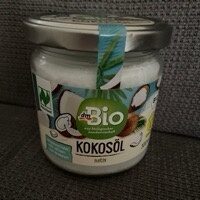
Barcode: 4066447646283
Kokosöl
HALAL
📝 Reason: Kokosöl is derived from coconuts, which are plant-based and do not involve any animal derivatives or alcohol in their processing, making it Halal compliant. Islamic sources emphasize the permissibility of plant-based foods unless contaminated with Haram substances.
📄 Certificates: None
Ingredients:
Details
Is Kokosöl Halal? Let’s Uncover Its Status
Kokosöl, known as coconut oil in English, is a widely used cooking oil known for its versatile properties and health benefits. If you’re wondering about its Halal status, you’re in the right place. This post will delve into the reasons why Kokosöl is considered Halal, examining its ingredients, status, and more.
Understanding Halal Status
Halal is an Arabic term meaning ‘permissible’ in Islam. Foods that comply with Islamic dietary laws are classified as Halal. For a product to be Halal, it must not include any animal-derived products or alcohol. Kokosöl is derived from coconuts, which are entirely plant-based. This means that it does not contain any animal derivatives, making it compliant with Halal standards.
The Composition of Kokosöl
The primary ingredient in Kokosöl is itself—Kokosöl (coconut oil). According to the ingredient analysis, Kokosöl is derived from coconuts, emphasizing that it originates from plants rather than animals. This is crucial because Islamic dietary laws endorse the consumption of plant-based foods as long as they are not contaminated with non-Halal substances.
Examining E-Numbers and Ingredients
Most Kokosöl products do not contain additives or preservatives that require E-numbers, ensuring that what you are consuming maintains its natural state. The analysis of E-numbers in this case indicates:
- ECode: N/A
- Name: Kokosöl
- Status: HALAL
- Details: Derived from coconut, a plant-based source with no animal derivatives or alcohol.
- Source: Islamic Dictionary, IFANCA
Why Kokosöl is Considered Halal
According to Islamic dietary laws, all plant-based foods are Halal unless they are contaminated with harmful or non-Halal substances. Since Kokosöl does not contain any animal products or alcohol, it comfortably fits within these guidelines. The absence of any E-number coding further establishes its whole and natural form.
Certifications and Brand Integrity
While Kokosöl does not possess any certifications, its Halal status is derived from its pure composition. As more individuals seek Halal products, transparency in the food supply chain becomes crucial. Even in the absence of formal certification, the inherent properties of Kokosöl corroborate its status as Halal. Consumers can confidently integrate Kokosöl into their cooking, knowing it adheres to their dietary needs.
Conclusion
Kokosöl stands out as a valuable staple in various culinary applications, all while ensuring compliance with halal dietary requirements. With its natural derivation from coconuts and lack of non-Halal substances or animal products, it is a safe choice for anyone adhering to Halal guidelines. Next time you’re considering whether to use Kokosöl, rest assured you’re making a Halal-friendly choice!

